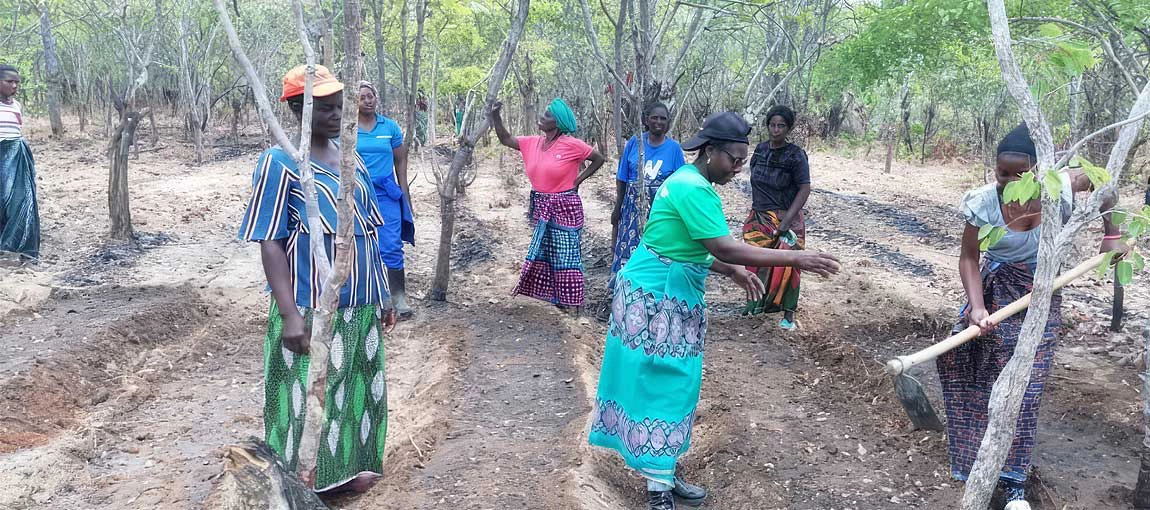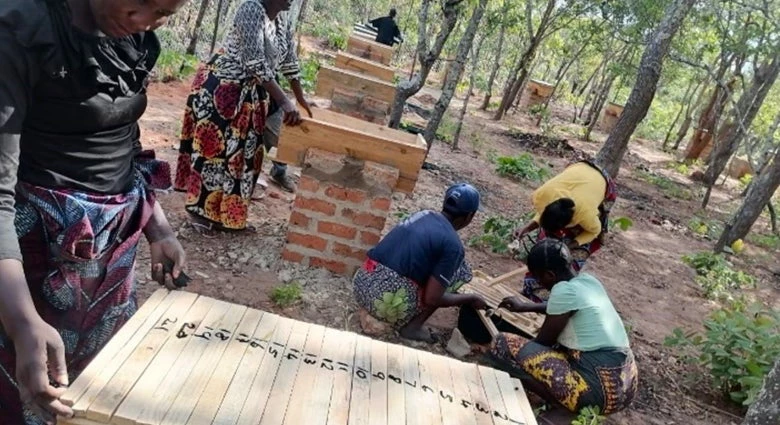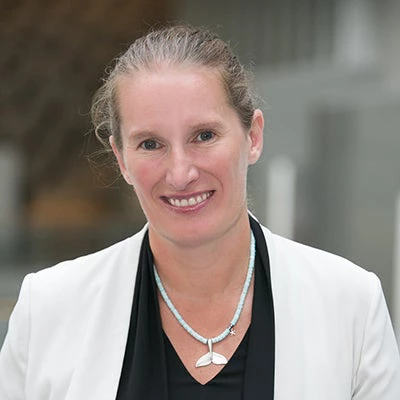 Community members preparing garden fields in the forest. Photo: TRALARD project office
Community members preparing garden fields in the forest. Photo: TRALARD project office
The Transforming Landscapes for Resilience and Development Project (TRALARD) is supporting the sustainable use of natural resources to improve livelihoods of targeted communities in Zambia, and we had the privilege of witnessing its transformative effects during our visit to the Kaloswe Community Forest Management Group (CFMG) in Mpika District, Muchinga Province in November of 2023.
TRALARD is pioneering a landscape model that aims to build a sustainable forest economy in Zambia. By managing, restoring, and conserving natural resources, the project is helping create jobs and protect the interests of smallholder and forest-dependent communities . This is crucial for Zambia as it seeks to reverse forest and land degradation and enhance the resilience of communities to climatic shocks. In this blog, we will discuss the importance of such projects in building resilience to climate change and improving the overall well-being of communities.
The TRALARD project is implemented in Zambia’s Northern Region which comprises three provinces: Luapula, Muchinga, and Northern. This region is endowed with natural resources that include rich biodiversity, natural lakes, rivers, national parks, and waterfalls. It contains about half of Zambia’s wetlands of international importance listed under the Ramsar Convention and is home to about 3.5 million people or close to one-fifth of Zambia’s population.
Despite the rich resource endowments, the region ranks poorly in Zambia’s socioeconomic development. Communities lack economic opportunities and therefore rely on the exploitation of natural resources in ways that are barely regulated and unsustainable. This leads to the loss of the integrity and productive capacity of the natural landscapes. Primary economic activities in the region are subsistence agriculture, fishing, and exploitation of forest resources. As a result of this exploitation, Zambia’s Northern Region accounts for about 18% of the country’s annual tree cover loss. The country has approximately 45.9 million hectares of forest, representing approximately 66% of its total land mass. Annual rates of deforestation are high, placing the country among those with the highest rates of deforestation in the world, with approximately 300,000 ha of forest cover lost per year.
During our visit, we got to speak with Ivy Kaluba, the Chairperson of the Kaloswe Community Forest Management Group, who shared with us the impact that TRALARD has had on their community. Ivy explained that the project has enabled them to care for their children and households better than ever before. They have stopped cutting down trees, thanks to the alternative sources of income provided by TRALARD.
Kaloswe CFMG covers 1,053 hectares and is one of the CFMGs that received financial and technical support from the TRALARD Project. It has 174 members and directly benefits 892 community members (480 women and 412 men) through the provision of ecosystem goods and services from the forest under their management.
Traditionally, the livelihoods of the community members in Kaloswe CFMG have relied on the exploitation of forest resources. However, about a year ago, the group received project support of nearly $50,000 to establish institutional structures, including the development and implementation of a forest management plan. This plan outlines viable community forest-based enterprises that aim to support socioeconomic benefits and opportunities, as well as the sustainable management of the 1,053-hectare community forest.
Members of the Kaloswe CFMG embraced the new opportunities in the plan, such as beekeeping and poultry farming . With project support, they established an apiary with 100 beehives. During our visit, community members shared that they expect to earn between $1,500 and $5,000 per honey harvest, which occurs twice a year. This income from beekeeping provides economic opportunities for the members, enabling them to start other small businesses. It also empowers the community by allowing them to send their children to school and build better houses. It reduces their reliance on the unsustainable extraction of natural resources from their dwindling forests.
In addition to beekeeping, the group has taken up agroforestry on 0.4 hectares of land, growing various vegetables, such as tomatoes, rape, and chibwabwa (pumpkin leaves). They’ve been able to supply their produce to market traders and residents in the surrounding villages. During our visit, they mentioned that they had just finished their vegetable harvest, which generated ZMW12,600 (about $500) in revenue.
Sharing the benefits of their “forest economy” is becoming well-established. From the earnings generated this time, the members allocated ZMW5,000 to support 10 vulnerable members in covering the school costs for their children. The remaining ZMW7,600 was reinvested in rearing chickens for sale (a diversification from the original forest-based enterprises when funds had been earned). Diversification of economic opportunities beyond those that are greatly affected by climate change helps reduce the pressure on natural resources and supports the sustainable management of forest resources.
The financial and technical support provided to forest enterprises is having a positive impact on the communities in the Northern Region of Zambia. Through this support, communities have come to appreciate the value of their forests and have become more aware of climate change and sustainable management practices.
Another key achievement of this support has been the reduction in charcoal production which can be partly attributed to the awareness campaigns that have been conducted, as well as the forest-based socioeconomic benefits and opportunities that communities themselves have experienced. By seeing the benefits of sustainable forest management, communities are now more inclined to protect their forests and engage in alternative livelihood activities .
The natural resources in the Northern Region of Zambia hold great potential for socioeconomic development of both rural and urban communities. These resources can clearly provide economic opportunities and have environmental benefits of national and global value. The TRALARD project is playing a crucial role in supporting the Government of Zambia to raise awareness, promote sustainable management practices, and create socioeconomic opportunities for the communities, strengthening economic inclusion and environmental conservation of the region.




Join the Conversation